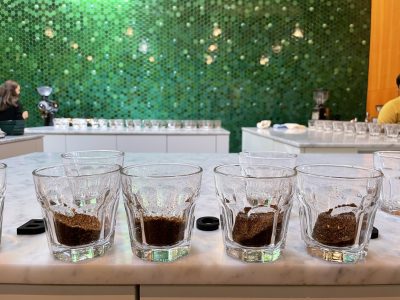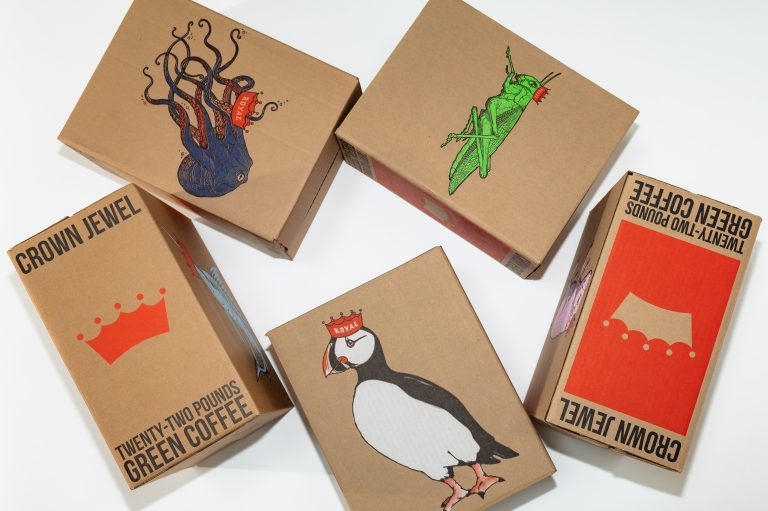Few people have been able to effectuate change in the lives of others the way Mayra Orellana-Powell has through with her company, Catracha Coffee, and through her charitable work with The Catracha Community Project. In honor of Catracha Coffee’s upcoming tasting event at The Crown on July 11th, we’re taking a look back at this nearly decade-long relationship.
“In her first year of operation, back in 2010, Mayra imported 50 bags of her communities’ coffee, entirely on her own, from Honduras to Oakland. I think she was paying something like 50 cents per pound to have it imported, which is insane.” says Royal Coffee CEO Max Nicholas-Fulmer. “But that’s just Mayra – she has an infectiously positive outlook and whenever she’s faced with a problem, she immediately looks for a solution.”
All of the coffee that Catracha exports is from Mayra’s hometown of Santa Elena, Honduras. Catracha began exporting coffee from just 13 producers and has grown to a network of over 80 producers today. Catracha has a profit sharing model, so farmers receive a premium for the sale of their coffee and producers use the extra capital to improve farm infrastructure and for the needs of their families. In addition to these premiums, Catracha holds meetings with the producers throughout the year to provide more support and resources, like workshops with agronomists regarding farm fertilization, pruning, or even information on how to calibrate depulpers.
“The first few years of Catracha were focused on post-harvest processing, to ensure that everyone could produce quality coffee,” says Mayra. “In the last few years, we have focused more on farm management, mostly to protect the farms from leaf rust damage. We’ve also been promoting organic strategies, which includes using bokashi (a composting technique using an anaerobic process that relies on inoculated bran to ferment waste) and organic sprays to improve the nutritional health of the plants.”
“When it comes to her coffee, she really has the best interests of everyone in the chain at heart,” Max adds. In partnership with Royal, the network of Catracha producers has grown and so has the responsibility Mayra feels towards the community. Three years ago, Mayra and her husband Lowell made the decision to move back to Santa Elena in order to further their support for the producers and the community at large. Lowell is now involved full time with Catracha and spends much of his time visiting farmers and getting to know what extra resources they need to help drive their success.
“We spent more than a year renovating my grandmother’s house that we inherited. It’s kind of like Santa Elena’s version of The Crown. We host weekly art workshops and have an art residence and studio at our house. We’ve hosted artists from Honduras and around the world that have been running art classes for the community, two days a week, for over a year. Every week, more than 30 kids come and learn art here. Public art is starting to pop up everywhere! There are now more than 30 murals along the streets of Santa Elena, in producers homes and at many schools,” says Mayra. “Our house has also been a place to host coffee buyers. And when the buyers come, we have the space to invite the families who produce the Catracha Coffee for dinner together. We like to make pizza, which is not very common in Santa Elena, and play games.”
Because of Mayra’s love for her community and her openness, she has made Santa Elena a destination that coffee buyers love to visit. This connection between coffee buyer and coffee producer is so important and allows us to thank the producers who work so hard to produce this coffee we love so much.
“On my first visit to Santa Elena, we were able to roast and cup alongside the Catracha farmers. For nearly every one of them, it was the first time they’d ever tasted the coffee that they export. Typically they only get to drink what is leftover, the desmanche. So, to see the looks on their faces as we explained what attributes we liked about each of their coffees was very rewarding. This scene was documented in “The Way Back to Yarasquin” and is one of my prouder moments in the coffee business,” says Max. “The longevity of the project has been very rewarding. Many things in coffee come and go, so to make it close to a decade with many of the same roasters participating year after year has been great.”
“Each year we have been adding Catracha producers, which means we are always looking for new roasters to connect with,” Mayra says. “The goal is to sell coffee at prices that help producers work sustainably. So far so good. This July, like every July for the last 8 years, we will return profits to producers, thanks to the extraordinary coffee communities here.


